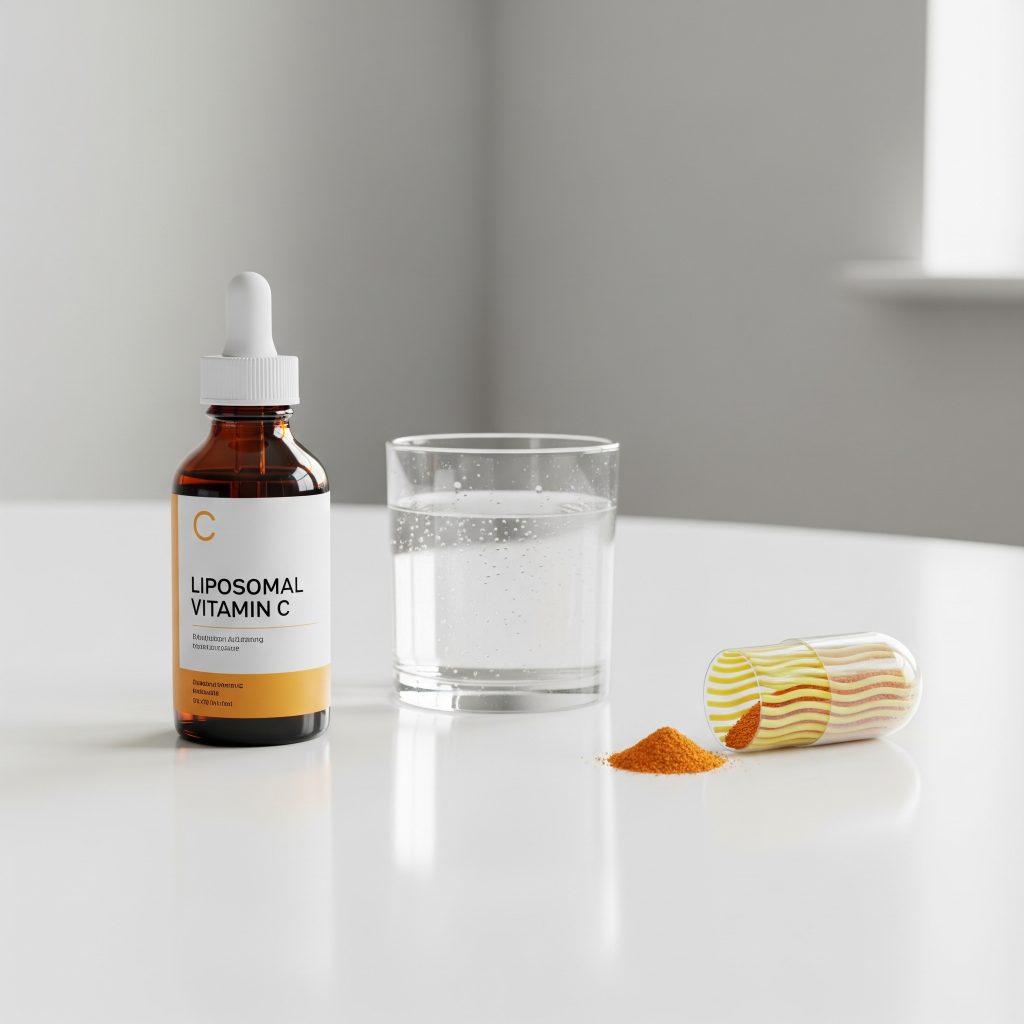Vitamin C benefits go far beyond immune support – it’s vital for skin, heart health, and even redox balance. Yet not all vitamin C supplements are absorbed equally, and dosing matters more than most people realize. This article breaks down how vitamin C works in the body, compares supplement types (including liposomal), and shows how to match your intake to your health needs.
Whether you’re optimizing everyday wellness or managing specific conditions, understanding the science behind vitamin C dosage and delivery can help you make better decisions. Let’s take a closer look at what the latest evidence says.
Summary / Quick Answer
Vitamin C supports collagen production, immunity, heart health, and antioxidant defense. But how much you need – and which form to take – depends on your goals.
Here’s what you need to know:
- Optimal daily dose: 200–400 mg for prevention, up to 2 g/day for targeted support
- Best form for sensitive stomachs: Buffered (sodium or calcium ascorbate)
- Best absorption: Liposomal vitamin C (≈25% higher Cmax than regular)
- IV vitamin C: Used clinically, achieves 50–100x higher plasma levels than oral
- Diet + supplement combo: Still the most practical strategy
Use our Vitamin C Dosage Calculator to find your personalized intake.
How Vitamin C Works in the Body
Vitamin C, or ascorbic acid, plays essential roles in connective tissue maintenance, neurotransmitter synthesis, and cellular protection against oxidative stress.

Key biochemical functions:
- Collagen production: Cofactor for hydroxylases that stabilize collagen’s triple helix
- Iron absorption: Helps convert dietary iron into its absorbable ferrous form – learn more
- Immune regulation: Supports lymphocyte activity, histamine clearance, and cytokine balance
- Antioxidant defense: Scavenges reactive oxygen species and regenerates vitamin E
In studies on dermal fibroblasts, physiological levels of ascorbate doubled collagen type I deposition in just three days. It also improved vascular collagen integrity and helped scorbutic animals regain skin strength faster.
Immune Support and Antioxidant Protection
While vitamin C’s immune benefits are well known, its mechanisms go deeper than you might expect.
Antioxidant pathways:
| Mechanism | Action | Context | Effect |
|---|---|---|---|
| Direct ROS neutralization | Scavenges hydroxyl radicals | Cytosol, plasma | Protects lipids, DNA |
| Regenerates vitamin E | Recycles α-tocopherol | Membranes | Enhances chain-breaking antioxidant action |
| DNA protection | Binds radical intermediates | Nuclei | Reduces oxidative DNA damage |
| Pro-oxidant at high IV doses | Generates H₂O₂ | Tumor microenvironment | Selective cytotoxicity |
At normal doses, vitamin C functions strictly as an antioxidant. But when delivered intravenously in gram-level doses, it acts as a selective pro-oxidant, generating hydrogen peroxide to target cancer and senescent cells.
Epidemiologic data consistently shows protective effects – not harm – from vitamin C on cellular health.
Collagen, Skin, and Vascular Benefits

One of the most visible vitamin C benefits is its impact on skin health and connective tissue.
- Vitamin C is required for collagen cross-linking, supporting firm, resilient skin
- Clinical studies link ascorbate with increased collagen synthesis in vascular and dermal tissues
- Learn more about how vitamin C supports your skin
In patients with hypertension or endothelial dysfunction, vitamin C restored vascular function and improved microcirculation.
Comparing Forms: Regular vs. Liposomal vs. Buffered
Not all vitamin C supplements are created equal. Here’s how they differ:
| Form | pH | GI Tolerance | Cmax (500 mg) | Notes |
| Ascorbic acid | Acidic (~2.1) | May irritate at >1 g | ~70 µM | Basic form |
| Sodium/Calcium ascorbate | Buffered (~7.0) | Better tolerated | ~70 µM | Ideal for GI sensitivity |
| Liposomal vitamin C | Neutral | Best tolerated | ~90 µM | ~25–30% higher Cmax |
Liposomal delivery encapsulates vitamin C in a lipid layer, improving absorption and reducing GI irritation. While still limited by transporter saturation, it can offer better plasma levels for high-demand scenarios.
Vitamin C Dosage Strategies
Finding the right dosage depends on your health goals. Here’s how science breaks it down:
Daily prevention:
| Population | Recommended Dose |
| Healthy adults | 200–400 mg/day |
| Smokers, elderly, diabetics | 250–500 mg/day |
| Pregnancy | 250 mg/day (diet + supplement) |
Split doses (e.g., 2 × 200 mg) improve retention and reduce GI symptoms.
Condition-specific support:
| Condition | Dose | Evidence |
| Mild hypertension | 500 mg 2x/day | Reduces SBP ~3 mmHg |
| Diabetic microvascular stress | 1 g with meals | Improves endothelial function |
| Frequent colds | 1 g/day | Shortens duration by ~8% |
You can also try our Vitamin C Dosage Calculator to estimate your needs.
High-Dose and IV Vitamin C: When and Why

Oral vitamin C maxes out plasma levels around 70–90 µM. IV delivery can exceed 10,000 µM.
IV use cases:
- Sepsis or critical illness: 6 g/day (divided)
- Oncology adjunct: 25–100 g/session, 2–3×/week
- Post-surgical oxidative stress (e.g., CABG): 2 g IV bolus pre-op
Monitoring (G6PD status, renal function) is essential before high-dose IV regimens. These approaches should only be pursued under clinical supervision.
Safety, Side Effects, and Interactions
Vitamin C is remarkably safe, but certain precautions apply:
- Upper limit (oral): 2 g/day to avoid diarrhea and bloating
- Kidney stone risk: Only relevant at IV doses >1 g in those with poor hydration or kidney issues
- Drug interactions: High doses may reduce statin levels slightly; monitor if combining
Buffered forms reduce GI upset. Liposomal forms are better tolerated at higher doses.
Practical Takeaways
- Eat your C: A diet rich in fruit and vegetables can provide 200–300 mg/day
- Supplement strategically: Choose your form based on GI tolerance and goals
- Divide larger doses: Improves absorption and minimizes discomfort
- Use liposomal if oral tolerance is an issue or you want slightly higher plasma levels
Explore our Best Vitamin C Supplements guide to find a product that fits your needs.
Conclusion
Vitamin C is far more than an immune booster – it’s a foundational nutrient for connective tissue, antioxidant defense, and cardiovascular health. While dietary sources remain key, targeted supplementation – especially with buffered or liposomal vitamin C – can offer important benefits.
Use our Vitamin C Dosage Calculator to personalize your intake and learn how vitamin C interacts with iron absorption and other nutrients.

